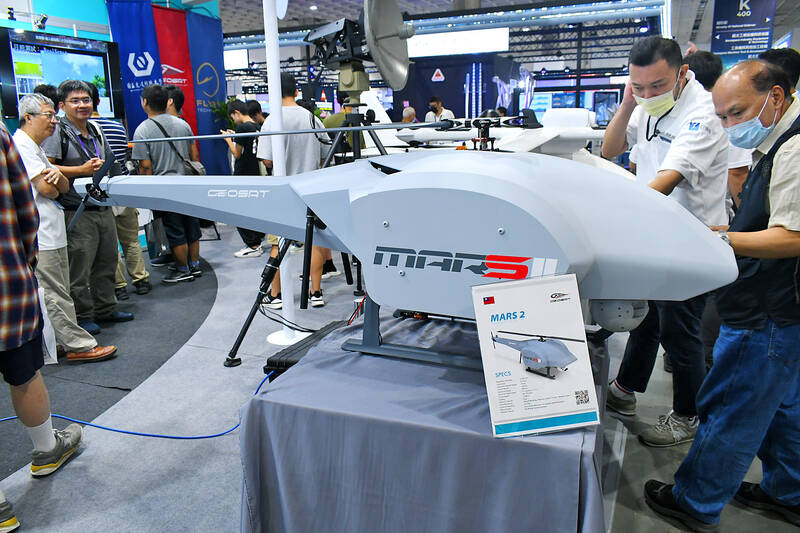Taiwan has signed an uncrewed aerial vehicle (UAV) development memorandum of understanding (MOU) with Arizona, the Ministry of Economic Affairs said yesterday.
The MOU was signed by Taiwan-USA Industrial Cooperation Promotion Office chief executive officer Jeff Lin (林昭憲) and Arizona-Taiwan Trade and Investment Office representative Steve Hsu (徐竹先) in Taipei on Monday, the ministry said in a statement.
Industrial Development Administration (IDA) Deputy Secretary-General Chen Pei-li (陳佩利) and Arizona Commerce Authority president and CEO Sandra Watson attended the signing ceremony, the ministry said.

Photo: Liu Yu-chieh, Taipei Times
The Russia-Ukraine war has drawn much global attention to the military use of drones, while the importance of civilian use of drones in communications, transportation and disaster relief has also gained importance, Chen said.
At a time when China accounts for 60 to 70 percent of the global commercial drone market, Taiwan and the US should work together to build a supply chain free from the Chinese Communist Party’s influence and ensure their national security, she said.
The IDA provides subsidies for the development of critical components for drones, including parts used in communications, payload capacity, flight control and artificial intelligence (AI) image recognition, the ministry said.
The IDA’s efforts aim to transform Taiwan into a drone supply hub and raise its status in the global economy, it said.
In addition, Taiwan opened the Asia UAV AI Innovation Application R&D Center in Chiayi County in August 2022 by integrating resources from more than 30 manufacturers for drone development, it said.
The cooperation with Arizona is expected to give additional technology support to Taiwan’s drone manufacturers, Chen said, adding that both sides would be able to take a larger share of the global drone market.
In April, the Industrial Technology Research Institute’s (ITRI) branch in North America signed an agreement with the center in Chiayi County, paving the way to drone development cooperation by taking advantage of ITRI’s resources in North America, Lin said.
The MOU signed on Monday would strengthen the partnership between Taiwan and Arizona, Lin said.
In addition to drone cooperation, Taiwan hopes to work with the US state in semiconductor equipment development, Chen said.
While Taiwan has built a strong pure-play wafer foundry services business, semiconductor equipment technology from the US has become an indispensable part of its success, she said.
As a result, Taiwan wants to reinforce cooperation in chip equipment development with the US, Chen said, adding that talent exchanges and training are expected to lay a good foundation.
Watson, who led a delegation to Taiwan for the MOU signing, said the US is looking forward to cooperating with Taiwan in drone and semiconductor development.
Taiwan Semiconductor Manufacturing Co (台積電), the world’s largest contract chipmaker, is building two advanced fabs in Arizona and plans to build a third one there, with investments in the US state expected to top US$65 billion.

MAKING WAVES: China’s maritime militia could become a nontraditional threat in war, clogging up shipping lanes to prevent US or Japanese intervention, a report said About 1,900 Chinese ships flying flags of convenience and fishing vessels that participated in China’s military exercises around Taiwan last month and in January last year have been listed for monitoring, Coast Guard Administration (CGA) Deputy Director-General Hsieh Ching-chin (謝慶欽) said yesterday. Following amendments to the Commercial Port Act (商港法) and the Law of Ships (船舶法) last month, the CGA can designate possible berthing areas or deny ports of call for vessels suspected of loitering around areas where undersea cables can be accessed, Oceans Affairs Council Minister Kuan Bi-ling (管碧玲) said. The list of suspected ships, originally 300, had risen to about

DAREDEVIL: Honnold said it had always been a dream of his to climb Taipei 101, while a Netflix producer said the skyscraper was ‘a real icon of this country’ US climber Alex Honnold yesterday took on Taiwan’s tallest building, becoming the first person to scale Taipei 101 without a rope, harness or safety net. Hundreds of spectators gathered at the base of the 101-story skyscraper to watch Honnold, 40, embark on his daredevil feat, which was also broadcast live on Netflix. Dressed in a red T-shirt and yellow custom-made climbing shoes, Honnold swiftly moved up the southeast face of the glass and steel building. At one point, he stepped onto a platform midway up to wave down at fans and onlookers who were taking photos. People watching from inside

Japan’s strategic alliance with the US would collapse if Tokyo were to turn away from a conflict in Taiwan, Japanese Prime Minister Sanae Takaichi said yesterday, but distanced herself from previous comments that suggested a possible military response in such an event. Takaichi expressed her latest views on a nationally broadcast TV program late on Monday, where an opposition party leader criticized her for igniting tensions with China with the earlier remarks. Ties between Japan and China have sunk to the worst level in years after Takaichi said in November that a hypothetical Chinese attack on Taiwan could bring about a Japanese

The WHO ignored early COVID-19 warnings from Taiwan, US Deputy Secretary of Health and Human Services Jim O’Neill said on Friday, as part of justification for Washington withdrawing from the global health body. US Secretary of State Marco Rubio on Thursday said that the US was pulling out of the UN agency, as it failed to fulfill its responsibilities during the COVID-19 pandemic. The WHO “ignored early COVID warnings from Taiwan in 2019 by pretending Taiwan did not exist, O’Neill wrote on X on Friday, Taiwan time. “It ignored rigorous science and promoted lockdowns.” The US will “continue international coordination on infectious